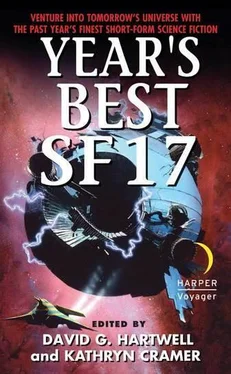Eleanor’s distant voice snapped him back to attention. “Here’s the thing, Gennady: we don’t know very much about this group that’s building the metastable weapon. By luck we’ve managed to decrypt a few emails from one party, so we know a tiny bit—a minimal bit—about the design of the bomb. It seems to be based on one of the biggest of the weapons ever tested at Semipalatinsk—its code name was the Tsarina .”
“The Tsarina ?” Gennady whistled softly. “That was a major, major test. Underground, done in 1968. Ten megatonnes; lifted the whole prairie two meters and dropped it. Killed about a thousand cattle from the ground shock. Scared the hell out of the Americans, too.”
“Yes, and we’ve discovered that some of the Tsarina ’s components were made at the Stepnogorsk Scientific Experimental and Production Base. In Building 242.”
“But SNOPB was a biological facility, not nuclear. How can this possibly be connected?”
“We don’t know how, yet. Listen, Gennady, I know it’s a thin lead. After you’re done at the SNOPB, I want you to drive out to Semipalatinsk and investigate the Tsarina site.”
“Hmmph.” Part of Gennady was deeply annoyed. Part was relieved that he wouldn’t be dealing with any IAEA or Russian nuclear staff in the near future. Truth to tell, stalking around the Kazaks grasslands was a lot more appealing than dealing with the political shit-storm that would hit when this all went public.
But speaking of people … He glanced up at the hotel’s one lighted window. With a grimace he pocketed his augmented reality glasses and went up to the room.
Ambrose was sprawled on one of the narrow beds. He had the TV on and was watching a Siberian ski-adventure infomercial. “Well?” he said as Gennady sat on the other bed and dragged his shoes off.
“Tour of secret Soviet anthrax factory. Tomorrow, after egg McMuffins.”
“Yay,” said Ambrose with apparent feeling. “Do I get to wear a hazmat suit?”
“Not this time.” Gennady lay back, then saw that Ambrose was staring at him with an alarmed look on his face. “Is fine,” he said, waggling one hand at the boy. “Only one underground bunker we’re interested in, and they probably never used it. The place never went into full production, you know.”
“Meaning it only made a few hundred pounds of anthrax per day instead of the full ton it was designed for! I should feel reassured?”
Gennady stared at the uneven ceiling. “Is an adventure.” He must be tired, his English was slipping.
“This sucks.” Ambrose crossed his arms and glowered at the TV.
Gennady thought for a while. “So what did you do to piss off Google so much? Drive the rover off a cliff?” Ambrose didn’t answer, and Gennady sat up. “You found something. On Mars.”
“No that’s ridiculous,” said Ambrose. “That’s not it at all.”
“Huh.” Gennady lay down again. “Still, I think I’d enjoy it. Even if it wasn’t in real-time … driving on Mars. That would be cool.”
“That sucked too.”
“Really? I would have thought it would be fun, seeing all those places emerge from low-res satellite into full hi-res three-d.”
But Ambrose shook his head. “That’s not how it worked. That’s the point. I couldn’t believe my luck when I won the contest, you know? I thought it’d be like being the first man on Mars, only I wouldn’t have to leave my living room. But the whole point of the rover was to go into terrain that hadn’t been photographed from the ground before. And with the time-delay on signals to Mars, I wasn’t steering it in real time. I’d drive in fast-forward mode over low-res pink hills that looked worse than a forty-year-old video game, then upload the drive sequence and log off. The rover’d get the commands twenty minutes later and drive overnight, then download the results. By that time it was the next day and I had to enter the next path. Rarely had time to even look at where we’d actually gone the day before.”
Gennady considered. “A bit disappointing. But still more than most people ever get.”
“More than anyone else will ever get.” Ambrose scowled. “That’s what was so awful about it. You wouldn’t understand.”
“Oh?” Gennady arched an eyebrow. “If you grow up in the Soviet Union, you know a little about disappointment.”
Ambrose looked mightily uncomfortable. “I grew up in Washington. Capital of the world! But my dad went from job to job, we were pretty poor. So every day I could see what you could have, you know, the Capitol dome, the Mall, all that power and glory … what they could have—but not me. Never me. So I used to imagine a future where there was a whole new world where I could be …”
“Important?”
He shrugged. “Something like that. NASA used to tell us they were just about to go to Mars, any day now, and I wanted that. I dreamed about homesteading on Mars.” He looked defensive; but Gennady understood the romance of it. He just nodded.
“Then, when I was twelve, the Pakistani-Indian war happened and they blew up each other’s satellites. All that debris from the explosions is going to be up there for centuries! You can’t get a manned spacecraft through that cloud, it’s like shrapnel. Hell, they haven’t even cleared low Earth orbit to restart the orbital tourist industry. I’ll never get to really go there! None of us will. We’re never gettin’ off this sinkhole.”
Gennady scowled at the ceiling. “I hope you’re wrong.”
“Welcome to the life of the last man to drive on Mars.” Ambrose dragged the tufted covers back from the bed. “Instead of space, I get a hotel in Kazakhstan. Now let me sleep. It’s about a billion o’clock in the morning, my time.”
He was soon snoring, but Gennady’s alarm over the prospect of a metastable bomb had him fully awake. He put on his AR glasses and reviewed the terrain around SNOPB, but much of the satellite footage was old and probably out of date. Ambrose was right: nobody was putting up satellites these days if they could help it.
Little had probably changed at the old factory, though, and it was a simple enough place. Planning where to park and learning where Building 242 was hadn’t reduced his anxiety at all, so on impulse he switched his view to Mars, The sky changed from pure blue to butterscotch but otherwise the landscape looked disturbingly similar. There were a lot more rocks on Mars, and the dirt was red, but the emptiness, the slow rolling monotony of the plain and stillness were the same, as if he’d stepped into a photograph. (Well, he actually had, but he knew there would be no more motion in this scene were he there.) He commanded the viewpoint to move, and for a time strolled, alone, in Ambrose’s footsteps—or rather, the ruts of Google’s rover. Humans had done this in their dreams for thousands of years, yet Ambrose was right—this place was, in the end, no more real than those dreams.
Russia’s cosmonauts had still been romantic idols when he was growing up. In photos they had stood with their heads high, minds afire with plans to stride over the hills of the moon and Mars. Gennady pictured them in the years after the Soviet Union’s collapse, when they still had jobs, but no budget or destination any more. Where had their dreams taken them?
The Baikonur spaceport was south of here. In the end, they’d also had to settle for a hard bed in Kazakhstan.
In the morning they drove out to the old anthrax site in a rented Tata sedan. The fields around Stepnogorsk looked like they’d been glared at by God, except where bright blue dew-catcher fencing ran in rank after rank across the stubble. “What’re those?” asked Ambrose, pointing; this was practically the first thing he’d said since breakfast.
Читать дальше












